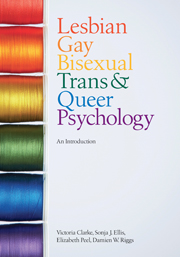Book contents
- Frontmatter
- Contents
- List of boxes
- Introduction: how to read and use this book
- Section I History, contexts and debates in LGBTQ psychology
- Section II Understanding social marginalisation in LGBTQ lives
- Section III LGBTQ experiences across the lifespan
- Conclusion
- Glossary
- Additional resources
- References
- Index
Introduction: how to read and use this book
- Frontmatter
- Contents
- List of boxes
- Introduction: how to read and use this book
- Section I History, contexts and debates in LGBTQ psychology
- Section II Understanding social marginalisation in LGBTQ lives
- Section III LGBTQ experiences across the lifespan
- Conclusion
- Glossary
- Additional resources
- References
- Index
Summary
The book is intended as a specialist textbook that will support a course or lecture block on LGBTQ psychology (or the psychology of sexualities and genders). At the same time, each chapter is intended to stand alone, and provide an introduction to a particular aspect of LGBTQ psychology, so LGBTQ perspectives and experiences can be incorporated into a wide range of psychology topics such as, for example, lifespan development, prejudice, health, research methods, family and relationships. Readers ‘dipping in’ to some of the later chapters can consult the glossary for definitions of key concepts.
What's in this book?
The book is divided into three sections plus a concluding chapter.
Section I (History, contexts and debates in LGBTQ psychology) provides an overview of the theoretical, methodological, political and practical issues and debates that inform LGBTQ psychological research. Chapter 1 explores the history and development of the field of LGBTQ psychology. It discusses the work of early sexologists, the ‘founding fathers’ of sexuality and gender research, the emergence of ‘gay affirmative’ psychology in the 1970s and the subsequent development of LGBTQ psychology as a recognised sub-field of psychology. Chapter 2 summarises some of the key theoretical and political perspectives that inform research in the area, and examines the relationship between LGBTQ psychology and related areas of research such as queer theory and feminist psychology. It also examines the relationship between LGBTQ psychology and positive social change for LGBTQ communities and individuals. Chapter 3 provides insight into doing LGBTQ psychological research.
- Type
- Chapter
- Information
- Lesbian, Gay, Bisexual, Trans and Queer PsychologyAn Introduction, pp. xi - xxPublisher: Cambridge University PressPrint publication year: 2010



